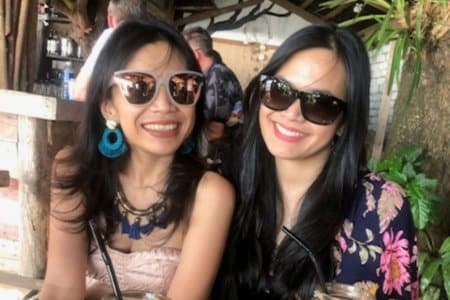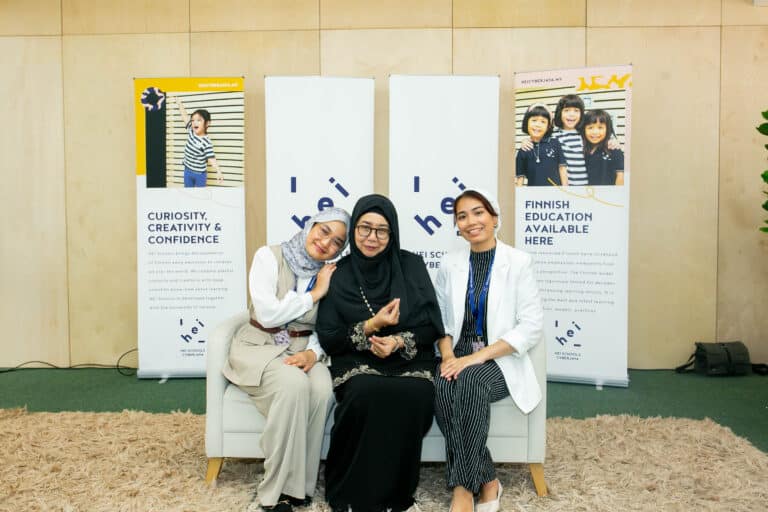
Suraya Jermadi and Syahirah Jermadi were born in Malaysia but grew up in the UK for most of their early years.
As the older sibling, Suraya had experienced Malaysia’s public education system before she joined the UK primary school system.
“During that time, I was already aware of the different experiences between schooling locally and internationally because of the environment and teaching approach,” says Suraya.
“This was when I was first exposed to the concept of inclusive education with friends and classmates with different abilities, like ADHD and dyslexia, sharing a regular class with me.”
While Malaysia is working towards a more inclusive education system, critics believe the current system is still far from ideal.
In 1962, the Malaysian government introduced the Integrated Special Education Programme for primary school children with disabilities to learn in segregated classrooms within the mainstream school compound.
Parents didn’t find this arrangement good enough.
Those who could afford it sought alternatives — a report from 2019 showed that Malaysian parents found public schools were significantly less supportive (48%) than home, private, and international schools.
More schooling options for children with learning differences are available now.
Currently, there are an estimated 180 international and private schools around the country. One of the newer additions is HEI Schools Cyberjaya, an international preschool that brings the excellence of Finnish early childhood education to its students.
HEI Schools Cyberjaya is where the Suraya and Syahirah can be found working behind the operations.
Suraya, a multidisciplinary designer, works as a Brand and Marketing Manager, while Syahirah, a paediatric occupational therapist, is the Director of Operations.
We spoke to the sisters about their journey from growing up with a British education system, pursuing their higher education locally, and working together at an international school in Malaysia.
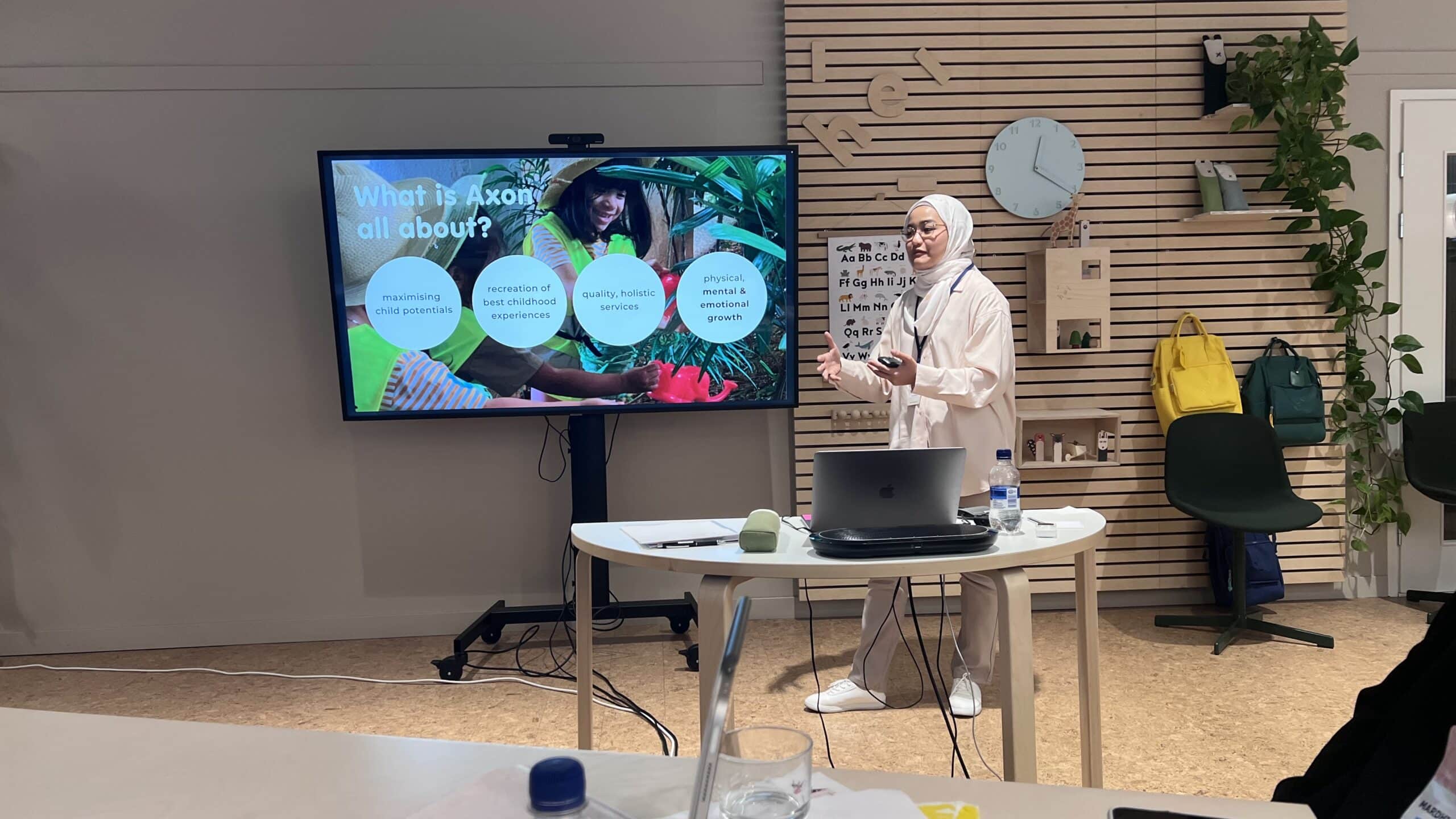
Syahirah implements her knowledge and skills as an occupational therapist in her role as the Director of Operations at HEI Schools Cyberjaya. Source: Syahirah Jermadi.
What sparked your interest in occupational therapy in the first place, Syahirah?
Syahirah: Growing up with a brother who has autism, I saw the challenges he had with everyday things.
He needed extra help from the right people, like occupational therapists, whose job was to help people like him learn daily skills and special educators who teach children with specific needs.
Our mum is a child psychiatrist who always championed children like my brother, and she was the one who inspired me to join the field. I wasn’t sure what to do when I grew up, but I knew I wanted to help others like her.
After finishing my foundation studies, I learned about occupational therapy and how it helps children with developmental challenges.
I loved that it made a difference in their lives, so I decided to become a paediatric occupational therapist, which lets me help children with special needs learn to do what they need and want to do every day.
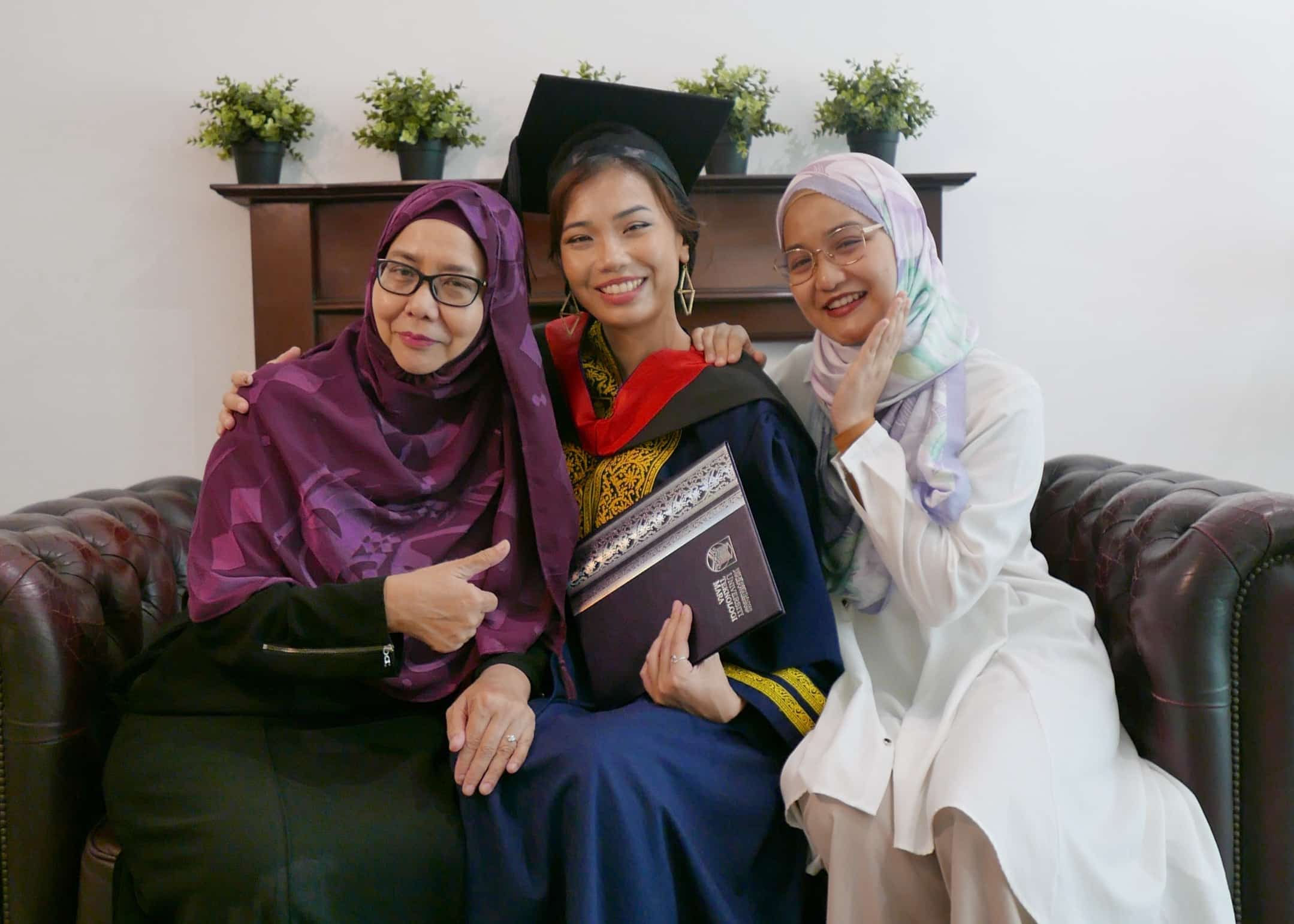
Suraya (middle) has a bachelor’s degree in Creative Technology (Hons), Animation and Screen Technology, and an MA in Visual Communication and New Media. Source: Suraya Jermadi.
Suraya, you chose to pursue the creative route. What was it about the field that caught your interest?
Suraya: I have been passionate about art and design since I was young. When I studied Advertising Design, I was exposed to subjects related to consumer psychology and how they perceive design or advertisements.
On a personal level, I also got involved in teaching visual arts to children. This inspired me to dig into the human mind, especially in children, whether neurotypical or atypical.
After taking courses in those areas, I became even more passionate about visual communications, starting from creating artwork or visual identity for brands to the outcome of it on the user or audience.
How have your early years abroad helped you in your job at an international school in Malaysia?
Suraya: It’s always refreshing to be exposed to different cultures and environments. It helps us explore ideas other than our own.
Sometimes, we evaluate ourselves on what fits our culture or mindset. That, along with my work experience and upbringing, has helped me to be more analytical and creative in learning to market an international school in Malaysia.
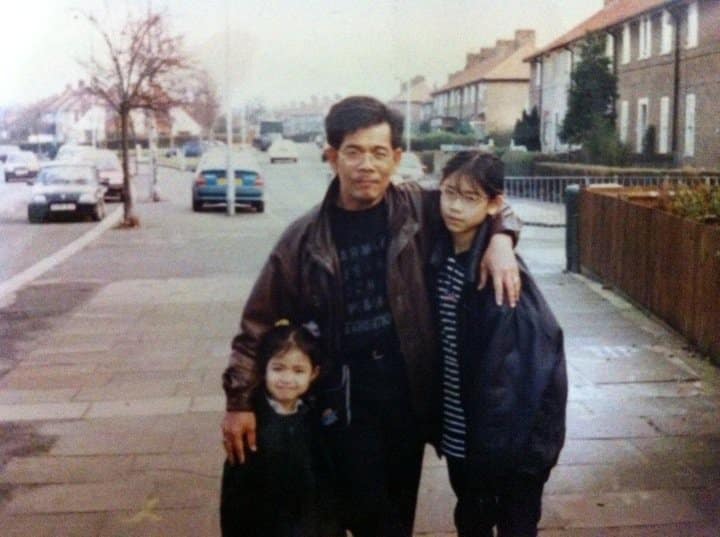
Suraya (R) and Syahirah (L) pictured with their father in the UK. Source: Suraya Jermadi.
What was your top memory of schooling abroad?
Syahirah: I spent most of my time in Reception (similar to preschool level) until some part of Year 2 at Downderry Primary School in Kent.
I recall having a really good time spending my early years of education there. There was a lot of play, hands-on projects, and kind, supportive teachers. I don’t think there was a day when I didn’t enjoy school.
Suraya: I was in Downderry Primary School and went to secondary school at Malory School in Downham. I loved going to school there, even when I was unwell.
I was the type of child who had difficulties learning in constricted settings. The environment and teachers there were friendly, which helped me socially and academically. As a shy girl growing up, this helped me boost my confidence to do what I liked.
In secondary school, I played for the girls’ basketball team and was in a Performing Arts programme at D&B Theatre School.
Despite growing up overseas, both of you pursued your bachelor’s and master’s degrees in Malaysia. What made you choose to pursue higher education locally?
Syahirah: We had a good time living in the UK when we were younger, and naturally, we considered studying abroad too.
However, a different opportunity was presented to us, and with the encouragement of our parents, we decided to pursue our studies locally.
As we studied at public universities, we had access to some of the most experienced academic staff in the programmes we were interested in. Studying with local experts also meant that we could understand our local context and what our community needs most.

Syahirah’s master’s thesis was on the topic of “Parental Stress and Parenting Styles in Managing Autism Children with Behaviour Problems”. Source: Syahirah Jermadi.
Did living overseas influence your career paths, especially for your work together at an international school like HEI Schools Cyberjaya?
Syahirah: It did influence our upbringing and personal development.
We learned a lot during our years abroad, where we adapted to a culture that shaped our social-emotional skills and critical thinking, something that is practised in our household until today.
As adults today, we still talk about how we have learned and improved individually and as a family.
When we lived in the UK, our family received support in helping our brother, who has autism, with his schooling and special care.
The school’s passionate involvement in his development was eye-opening for us and our parents.
So it’s safe to say that living overseas did contribute to our career paths because of the influence of our upbringing.
Our end goals as individuals still match with one another despite the different fields in which we specialise.
Working together under the HEI Schools brand is definitely a bonus because it complemented our values and advocacy for the next generation.
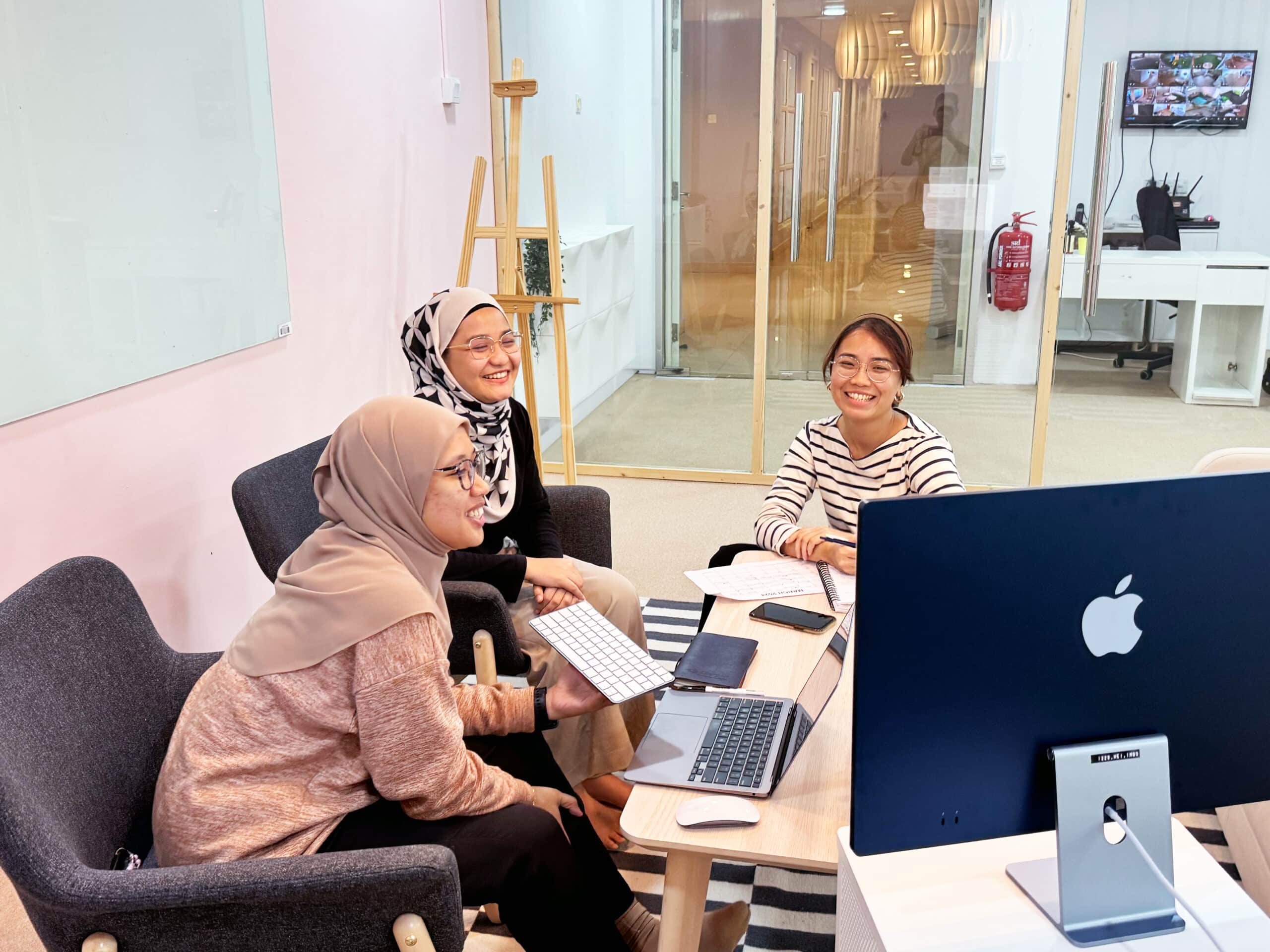
The sisters are now working together behind the operations for HEI Schools Cyberjaya. Source: Suraya Jermadi.
Both of you took two very different paths (one as a multidisciplinary designer and one as a paediatric occupational therapist) but are now working together and towards the same goal. What has that been like?
Suraya: We have had many ideas about doing stuff together, like community projects. We even hosted a parent support group together in the past.
The experience is interesting as we see each other doing our own thing and helping the other person out.
At times, separating being a sister and co-worker has been challenging, but we have learned different strategies to make things work.
We often collaborate as we bring our own uniqueness and skills. Syahirah brings knowledge in child development, I bring the ideas on getting that knowledge across to the public.
Having a common interest helps support our partnership too, and for us, that interest is in psychology.
What do you enjoy most about working together as sisters?
Syahirah: One thing would be how we could see eye to eye despite having different professional backgrounds. We enjoy sharing ideas and creativity and respect each other’s perspectives.
This was encouraged in our household growing up, where our parents are also from different backgrounds.
Our father is in the field of arts, while our mother is in the medical field. However, they both loved and encouraged creativity and sharing ideas and feedback – even the uncomfortable ones – between us.
As adults working together, we realise that our parents’ goal was to teach us about teamwork and supporting each other while putting our age differences and professional backgrounds aside.
I think that’s where we learned to find a middle ground in working together as sisters. We still do sisterly things when we get the chance.
Behind closed doors, we connect through our sister-telepathy ability and be goofy with each other.
We have even surprised ourselves with our colour-coordinated work attire, or one of the funniest incidents would be when we came to work wearing the same dress our mother bought!
There’s always entertainment in having each other around.








